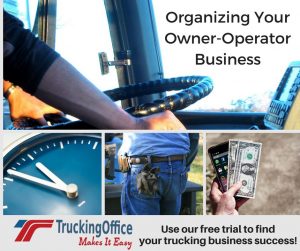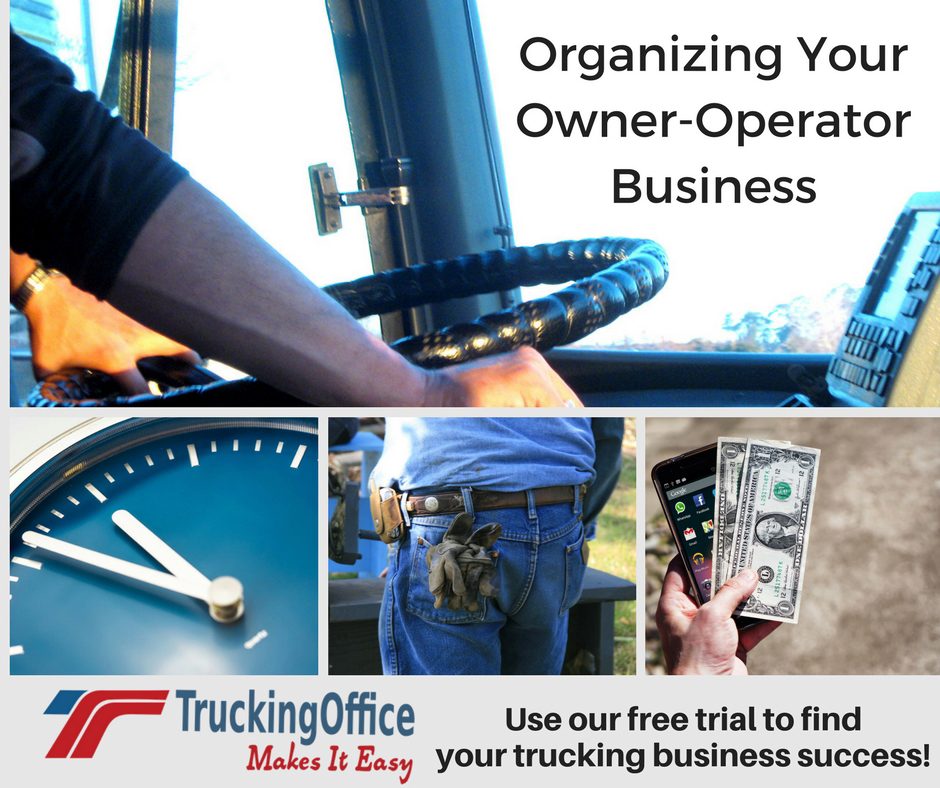It’s the last week of the busiest shipping season and you’ve probably moved more freight in the past two months than the first six months of the year. As an  owner-operator, that’s a tough way to run a business.
owner-operator, that’s a tough way to run a business.
We can’t deny that trucking’s slow season is January through March. There’s not much moving then. And right after the gift-giving season, that drop in income can hurt.
What can an owner-operator do?
Working on the business end of your trucking business is a smart thing to do – get set up for the upcoming spring and summer.
Get organized
If you’ve been trucking for a while, you’ve got a stash of records and papers and IFTA tags and whatever else you’ve collected over the years in boxes. It may be time to clean all that out. What do you need to keep?
DOT requirements
Check out this DOT list of the records you need to keep (and in the Appendix, how long to keep them) to help you know what paperwork you need to store. The form was last revised in December, 2017, which predates the ELD mandate and doesn’t mention it..
On top of the ELD records, you need to keep some other records.
- IFTA seals for the past 4 years. Fuel receipts should also be kept to prove your purchases.
- Business records that show your financial transactions such as invoices, expenses, maintenance records, and taxes. The IRS has a list.
So don’t hang onto those donut and coffee receipts unless you were buying for a customer (call it a marketing expense.)
Clean out the old torn maps and notes of phone numbers that you don’t recognize anymore. You can look up just about any number on Google now, anyway.
Store it or toss it?
Half the problems of getting organized revolve around the sheer bulk of accumulated stuff we have in our cabs or on our desks. Clean out your cab with a determination not to let anything stay that you don’t need. You’re living there, so make it look the way you want to live. I’m not telling you to throw away every crayon drawing from your favorite 3-year old, but perhaps paring down the collection will make your cab a more comfortable place to live. Take pictures of those pieces of art with your phone or tablet and you’ll be able to see them whenever you want. No clutter!
You’ve only got so much space. Learn to use it well. Clean it up with the strongest cleaner you’ve got and figure out how to store your trash. Plan a regular stop by a trash can when you refill your tank (stomach or fuel.)
Store it or toss it also applies to the maps, notes, old manuals, and cables you don’t need. The charger from the cellphone I lost in 2015 doesn’t need to still be in my cab! Talking about technology – take a look at the old tech you’re hauling around in the storage compartments. I keep an old, unusable phone in my desk drawer because I might need a phone number I’ve got stored in there. Only problem is that I have to recharge the phone every time I need the contact info. It would be a lot smarter of me to transfer all those numbers to my new phone.
Learn how to use your smartphone
Since you’re off the road, learn to use that fancy Christmas gift now. If you’ve got a teenager handy, they can show you, but don’t let them intimidate you. Most apps are simple to use – or one of their competitors is. Don’t feel locked into a program just because someone recommended it. There are lots of choices on Apple Play or Google Play. If you don’t like one app, you’re very likely to find one you do like. Be careful to read the details provided – lots of owner-operator trucking apps are free to download, but you have to pay to use their services. If you’re already using a trucking management software like TruckingOffice TMS, you may be getting a duplicated service from a paid app.
Owner-Operator Trucking Business
You need a system to keep track of your trucking business.
Being organized is a lot about getting the details out of your head and into a place that you can find them when you need them.
There are three categories that every trucker should be paying attention to – but often forget.
- Slow pay invoices.
- Customer development
- Business metrics.
If you only check the slow pays when you get home, you may be missing out on the details that will speed up those slow-poke shippers. I send an invoice but forget the BOL. 30 days later, they send me a notice that they’re not paying until they get the proper paperwork, but I miss that when I’m out on the road. (This is where knowing how to use a smartphone camera comes in really handy.) Then I’ve got another 30 days until they pay me and before I know it, the invoice payment is 30 to 45 days late and I need the cash to buy fuel. Not a good place to be, is it? Tracking slow pay invoices on a regular basis can be done in your cab while you’re waiting for a load with the right trucking management software.
We remember the bad customers, but do we remember the good ones? Keeping track of our customers even after the deliveries are done might lead to new loads. The best loads never make it onto the load boards; they’re already on someone’s trailer. Be that someone by keeping in touch with those shippers and their loading crew. Build relationships with them. It’s more than donuts. If you’re on social media, you can post pictures of your favorite shipping crews with thanks for the load or the speedy service. Send them the link and they’ll remember you.
Business metrics sounds a lot like math. It is. But it’s the math that will show you where you’re making money – and where you’re losing it. Do you know your revenue per mile? How about your expenses per mile? Those two numbers alone are the most critical numbers you must know if you want to be a successful owner-operator.
QuickBooks or using a cobbled-together system on Google might sound like good ideas, but frankly, QuickBooks doesn’t manage trucking businesses well because it’s designed for accountants, not truckers. I could spend a lot of time and create my own accounting system with Google Docs and Sheets. But that’s time I’m not earning money and I’ve already found a system that works without any tinkering: TruckingOffice TMS. I can know my revenue and expenses per mile in a matter of seconds. I can also know my IFTA, my IRP, and my fuel purchases almost immediately – in my cab.
Whether you’re home for a week or a month
The task of getting an owner-operator trucking business organized is worth the time. You’ll find even taking small steps now to get organized will have long term positive effects – even if it’s knowing where your vice grip is and not having to buy another one in a crunch. Many of the tasks you need to get organized are small enough to do during your down time if you have the right tools. It’s not just a matter of the right cleaner or how to use technology. It’s a matter of knowledge and how to apply it. Cleaning out a storage compartment can take as little as 10 minutes. Next time you’re stuck waiting to make a pick up, see what you can accomplish and how it will improve your trucking business.







Recent Comments